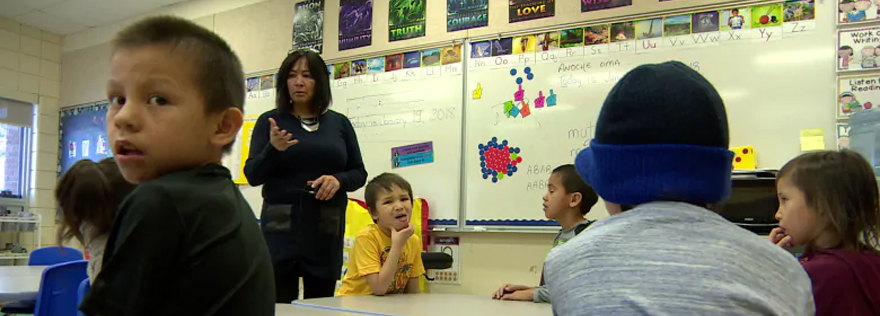Indigenous Research

Artwork is by Donald Chrétien, an Ojibwe First Nations artist
On this page
- Supporting Indigenous research and research training
- Advancing Indigenous research capacity and reconciliation
- Partnership with the National Centre for Truth and Reconciliation to advance Indigenous-led research
- Setting New Directions to Support Indigenous Research and Talent
- Indigenous not-for-profit organizations applying for institutional eligibility
- SSHRC funding opportunities
- Indigenous talent measures
- Imagining Canada’s Future
- Resources
- Indigenous research projects
Supporting Indigenous research and research training
Indigenous Advisory Circle
SSHRC’s Indigenous Advisory Circle provides guidance to advance reconciliation through Indigenous research and talent development programming. Through collaboration and co-development, the Circle provides advice to guide the development of SSHRC’s Indigenous Research and Indigenous Talent programming and other program-related initiatives.
The Circle includes an Indigenous Elder and researchers from First Nations, Inuit and Métis groups, as well as non-Indigenous researchers with in-depth experience working in partnership with Indigenous communities.
Research excellence includes the strengthening of Indigenous self-determination, leadership and capacity in research and research training, and respecting the value of Indigenous Knowledge systems.
SSHRC has long been committed to supporting research by and with First Nations, Inuit and Métis Peoples. SSHRC’s Indigenous Advisory Circle—formed in 2014—provides guidance to senior management to support and promote Indigenous research and talent development.
SSHRC supports Indigenous research and research training across all its funding opportunities. A crucial step to this work was clarifying what is meant by the term “Indigenous research.” The Indigenous Advisory Circle has thoughtfully crafted a clear definition of Indigenous research, which SSHRC uses to inform its work. With the guidance of the Indigenous Advisory Circle, SSHRC also created an Indigenous Research Statement of Principles and landmark resources to support and guide Indigenous research and talent, including Guidelines for the Merit Review of Indigenous Research.
Indigenous Research
Research in any field or discipline that is conducted by, grounded in or engaged with First Nations, Inuit, Métis or other Indigenous nations, communities, societies or individuals, and their wisdom, cultures, experiences or knowledge systems, as expressed in their dynamic forms, past and present. Indigenous research can embrace the intellectual, physical, emotional and/or spiritual dimensions of knowledge in creative and interconnected relationships with people, places and the natural environment.
Whatever the methodologies or perspectives that apply in a given context, researchers who conduct Indigenous research, whether they are Indigenous or non-Indigenous themselves, commit to respectful relationships with all Indigenous peoples and communities.
This understanding of Indigenous research reaffirms SSHRC’s support of research by and with Indigenous peoples. Research by and with Indigenous peoples and communities emphasizes and values their existing strengths, assets and knowledge systems.
All research involving Indigenous peoples must be undertaken in accordance with the second edition of the Tri-Council Policy Statement: Ethical Conduct for Research Involving Humans, and, in particular, Chapter 9: Research Involving the First Nations, Inuit and Métis Peoples of Canada.
Advancing Indigenous research capacity and reconciliation
In 2015, the Truth and Reconciliation Commission of Canada released its report Honouring the Truth, Reconciling for the Future, which identified 94 Calls to Action, and highlighted the important role of research to advance the understanding of reconciliation. Call to Action 65 specifically called for SSHRC to establish a national research program to advance the understanding of reconciliation. SSHRC further engaged with Indigenous organizations to help guide its approach in responding to the call.
SSHRC is fulfilling its commitment to Indigenous research and reconciliation through a diversity of agency-led initiatives and activities, as well as through activities organized in collaboration with Canada’s other federal research funding agencies, CIHR and NSERC.
Partnership with the National Centre for Truth and Reconciliation to advance Indigenous-led research
The National Centre for Truth and Reconciliation (NCTR) and SSHRC are partnering on a national research program to advance understanding of reconciliation, in response to the Truth and Reconciliation Commission of Canada’s Call to Action 65, and to support calls to action 71 to 76. Through research on reconciliation and residential schools, done by and with Indigenous communities, the collaboration will leverage the skills and knowledge of both parties—the NCTR’s expertise and ability to safeguard the truths of Survivors, their families, communities and others affected by the residential school system; and SSHRC’s role to promote and support research and training in the humanities and social sciences.
Setting New Directions to Support Indigenous Research and Talent
In 2017, the Canada Research Coordinating Committee (CRCC) reaffirmed the federal research funding agencies’ commitment to the Calls to Action of the Truth and Reconciliation Commission with the creation of a national dialogue with Indigenous communities to co-develop an interdisciplinary Indigenous research and research training model that contributes to reconciliation.
In 2018, SSHRC led, on behalf of the CRCC, co-development of a strategic plan to identify new ways of doing research by and with Indigenous communities. This included strategies to grow the capacity of First Nations, Métis and Inuit communities to lead their own research and partner with the broader research community.
Extensive engagement with First Nations, Inuit and Métis Peoples, which included awarding Indigenous Research Capacity and Reconciliation Connection Grants, and organizing regional events and a National Dialogue event, contributed to the co-development of an Indigenous Research Strategy to advance new models of support for Indigenous research and research training.
Setting New Directions to Support Indigenous Research and Research Training in Canada was launched in 2020 and sets out four directions to strengthen the capacity of First Nations, Inuit and Métis communities to lead their own research and partner with the broader research community:
- building relationships with First Nations, Inuit and Métis Peoples;
- supporting research priorities of Indigenous Peoples;
- creating greater funding accessibility; and
- championing Indigenous leadership.
The mechanisms identified in the strategy set the framework for an interagency approach to strengthening Indigenous research capacity guided by four key principles: self-determination, decolonization of research, accountability and equitable access.
In 2021, the CRCC published a progress report on the SIRC initiative. As of July 2022, key milestones include the following:
Indigenous Leadership Circle in Research
The Indigenous Leadership Circle in Research advises the presidents of Canada’s three federal research funding agencies—SSHRC, the Canadian Institutes of Health Research and the Natural Sciences and Engineering Research Council—and the Canada Foundation for Innovation, on the implementation of the interagency strategic plan Setting New Directions to Support Indigenous Research and Research Training in Canada 2019-2022. They will also monitor progress of the strategic plan’s implementation and may also provide guidance on ways to help enhance support for Indigenous research and training.
Reference Group for the Appropriate Review of Indigenous Research
The Reference Group for the Appropriate Review of Indigenous Research brings together a broad range of experience and expertise, including Knowledge Keepers, youth and academics at various stages of their careers. The group’s members, selected by a committee of Indigenous academics, will evaluate peer review models across Canada’s federal research funding agencies, and make recommendations on new methodologies to integrate Indigenous Knowledge systems and ways of knowing into review practices.
Indigenous not-for-profit organizations applying for institutional eligibility
In response to the Truth and Reconciliation Commission Report in 2015, and, in particular, Call to Action 65, SSHRC offers Indigenous not-for-profit organizations with a research mandate to apply for institutional eligibility.
SSHRC funding opportunities
SSHRC’s Talent, Insight and Connection funding opportunities welcome applications involving Indigenous research. See the Funding search tool for a complete list of SSHRC funding opportunities.
Indigenous talent measures
SSHRC supports research by and with Indigenous Peoples—in Canada and abroad—as well as Indigenous students and postdoctoral researchers seeking to advance careers in the social sciences and humanities. To learn more, consult Indigenous Talent Measures.
Imagining Canada’s Future
Indigenous research is integrated into the Future Challenge Areas being addressed through SSHRC’s Imagining Canada’s Future initiative, and, in particular, the question, “How are the knowledge systems, experiences and aspirations of First Nations, Inuit and Métis Peoples essential to building a successful shared future for all Canadians?” This future challenge area includes issues and subquestions on topics such as Indigenous youth and employment; historical and modern treaties; Indigenous values, cultures and knowledge systems; and endangered languages and cultures.
Resources
Below are SSHRC resources to support applicants working in Indigenous research; merit reviewers assessing applications related to Indigenous research; and communities and other research partners engaged in Indigenous research:
- Definition of Indigenous research
- Guidelines for the Merit Review of Indigenous Research
- Indigenous Advisory Circle
- Indigenous Leadership Circle in Research
- Indigenous Research Statement of Principles
- Tri-Council Policy Statement: Ethical Conduct for Research Involving Humans Chapter 9: Research Involving the First Nations, Inuit and Métis Peoples of Canada
- Tri-agency guideline on remuneration for Indigenous people participating in funded projects
Additional resources
- Report of the Royal Commission on Aboriginal Peoples
- Final Report of the Truth and Reconciliation Commission of Canada (PDF Document, 0.3 Mb)
- National Centre for Truth and Reconciliation
- Universities Canada principles on Indigenous education
- Indigenous Education Protocol for Colleges and Institutes
- Federation for the Humanities and Social Sciences: Charter on Equity, Diversity, Inclusion, and Decolonization in the Social Sciences and Humanities
Examples of SSHRC-supported Indigenous research projects
-

Decolonizing math education
What we can learn from Indigenous teaching methods
Researcher: Ruth Beatty, Lakehead University -

Bringing food, communities and culture together
A Cree-English cookbook helps reconnect Cree youth with Indigenous Knowledge and language
Researcher: Shailesh Shukla, University of Winnipeg(See November 2021 CBC article)
-

Equity in the art world
Training a new generation of Inuit art leaders
Researcher: Heather Igloliorte, Concordia University -

The artist and his art
Indigenous perspectives on the life and work of Norval Morrisseau
Researcher: Carmen Robertson, Carleton University -

Community-based source water protection planning
Increasing equitable access to safe drinking water
Researcher: Roseanna Radmanovich, First Nations Technical Services Advisory Group -

Environmental racism in Canada
How hazardous facilities disproportionately affect Indigenous and Black Nova Scotian communities
Researcher: Ingrid Waldron, Dalhousie University -

Indigenous language education
Helping Canadian schools support Indigenous language learning
Researcher: Frank Deer, The University of Manitoba -

Indigenous studies in public education
Helping teachers to include Indigenous perspectives and Knowledge in their classrooms
Researcher: Jean-Paul Restoule, University of Toronto -

NEȾOLNEW: One mind, one people and 42 Indigenous languages
A new language revitalization project led by the University of Victoria will bring new life and strength to Indigenous languages in Canada
Researcher: Onowa McIvor, University of Victoria -

UKâlalautta Inuttitut!
SSHRC funding supports Labrador Inuit revitalization of Inuktitut
Researcher: Tom Gordon, Memorial University of Newfoundland -

Meaningful engagement of northern Indigenous communities in research
Building bridges between science and Inuit Knowledge
Researcher: Eric Solomon, Ikaarvik: Barriers to Bridges -

SSHRC-funded research supporting the revitalization of Indigenous languages
Researcher: Andrea Sterzuk, University of Regina/Mela Sarkar, McGill University
- Date modified: